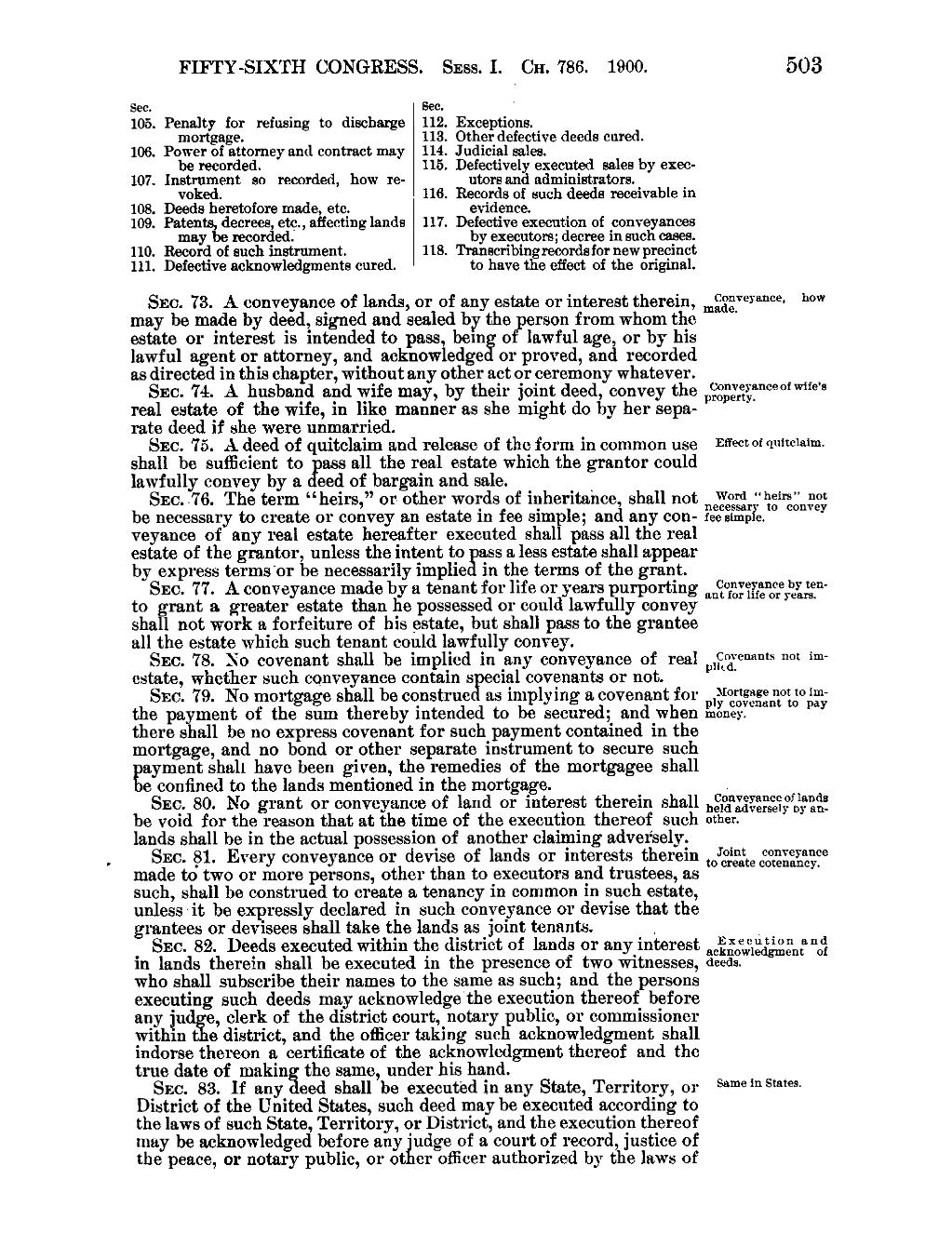FIFTY-SIXTH CONGRESS. Sess. I. Ch. 786. 1900. 503 Sec. Sec. ‘ 105. Penalty for refusing to discharge i 112. Exceptions. mortgage. 113. Other defective deeds cured. 106. Power of attorney and contract may 114. Judicial sales. be recorded. 115. Defectively executed sales by exec- 107. Instrument so recorded, how re- utors and administrators. voked. 116. Records of such deeds receivable in 108. Deeds heretofore made, etc. evidence. 109. Patents, decrees, etc., affecting lands 117. Defective execution of conveyances may be recorded. by executors; decree in such cases. 110. Record of such instrument. l 118. Transcribingrecordsfor new precinct 111. Defective acknowledgments cured. to have the effect of the original. Sec. 73. A conveyance of lands, or of any estate or interest therein, mQgg"°Y¤¤°°· Mw may be made by deed, signed and sealed by the erson from whom the ` estate or interest is intended to pass, bein ofp lawful age, or by his lawful agent or attorney, and acknowledged. or proved, and recorded as directed in this chapter, without any other act or ceremony whatever. Sec. 74. A husband and wife may, by their joint deed, convey the p§g;)‘g’,§§““°*°""‘°`“ real estate of the wife, in like manner as she might do by her sepa- ` rate deed if she were unmarried. Sec. 75. A deed of quitclaim and release of the form in common use E¢¥¤<=¤<>f <x¤it¢1¤i¤¤· shall be sufficient to ass all the real estate which the grantor could lawfully convey by a deed of bargain and sale. Sec. .7 6. The term "heirs," or- other words of inheritance, shall not mfVéY;;<;rj‘Q¤i¤"¤§0¢ be necessary to create or convey an estate in fee simple; and any con- feecsimple. O CO Wy veyance of any real estate hereafter executed shall pass all the real estate of the grantor, unless the intent to pass a less estate shall appear by express terms `or be necessarily implie in the terms of the grant. Sec. 77. A conveyance made by a tenant for life or years purporting anQ<;g;$g};¤(§€yl;§;§¤· to grant a greater estate than he possessed or could lawfully convey ` sha l not work a forfeiture of his estate, but shall pass to the grantee all the estate which such tenant could lawfully convey. Sec. 78. No covenant shall be implied in any conveyance of real ),§*§‘=’=¤=*¤*S ¤¤¤ i¤¤· estate, whether such conveyance contain slpecial covenants or not. I ' Sec. 79. No mortgage shall be construe as implying a covenant for l>[<;¤geggg§&¤;g¤ igthe payment of the sum thereby intended to be secured; and when fitting;. p Y there shall be no express covenant for such payment contained in the mortgage, and no bond or other separate instrument to secure such payment shall have been given, the remedies of the mortgagee shall be confined to the lands mentioned in the mortgage. . Sec. 80. No grant or conveyance of land or interest therein shall h§§,“;g§*;;;$;;‘;’ft};§‘;‘,§§ be void for the reason that at the time of the execution thereof such other. lands shall be in the actual possession of another claiming adversely. , Sec. 81. Every conveyance or devise of lands or interests therein mlggfm §(;*;§§{1·*&¤;,°€ made to two or more persons, other than to executors and trustees, as ` such, shall be construed to create a tenancy in common in such estate, unless it be expressly declared in such conveyance or devise that the grantees or devisees shall take the lands as joint tenants. _ p Sec. 82. Deeds executed within the district of lands or any interest acigglggéggng **0*} in lands therein shall be executed in the presence of two witnesses, deeds. who shall subscribe their names to the same as such; and the persons executing such deeds may acknowledgethe execution thereof before any jud e, clerk of the district court, notary public, or commissioner within tie district, and the officer taking such acknowledgment shall indorse thereon a certincate of the acknowledgment thereof and the true date of makin the same, under his hand. Sec. 83. lf any deed shall be executed in any State, Territory, or S“m°i¤ Sales- District of the United States, such deed may be executed according to the laws of such State, Territory, or District, and the execution thereof may be acknowledged before any judge of a court of record, justice of the peace, or notary public, or other officer authorized by the laws of
Page:United States Statutes at Large Volume 31.djvu/555
This page needs to be proofread.
